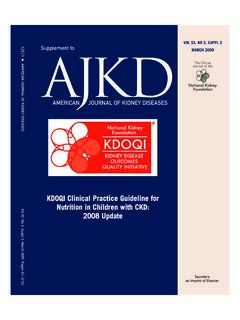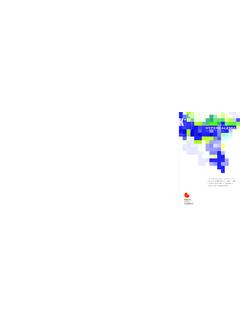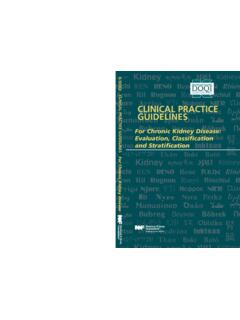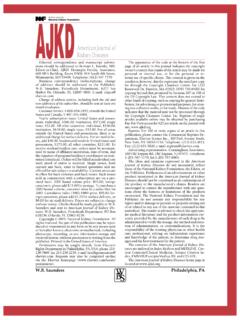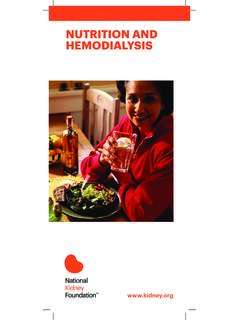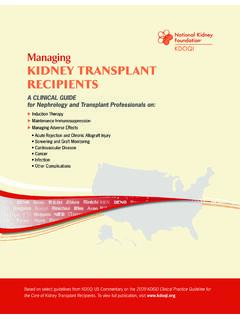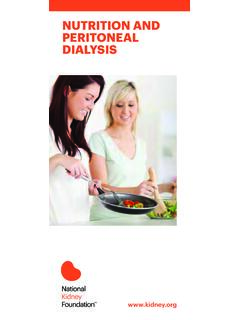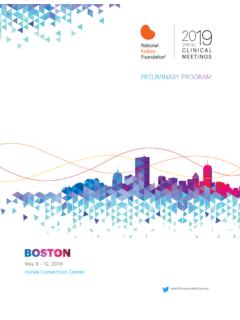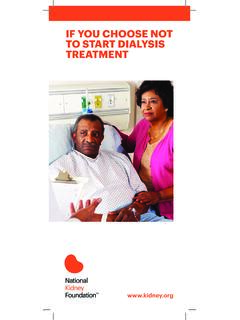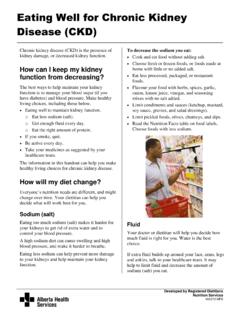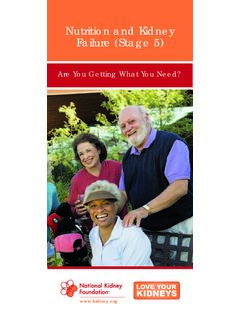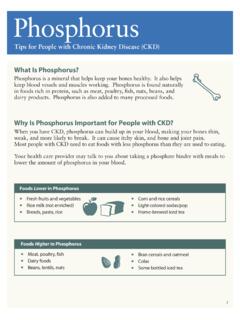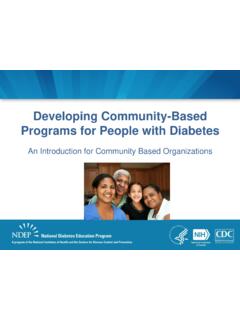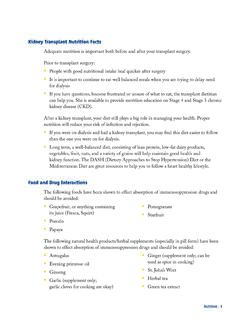Transcription of NutritioN aNd ChroNiC KidNey disease (stages 1–4)
1 NutritioN aNd ChroNiC KidNey disease (stages 1 4) Are You Getting What You Need? KidNey FouNdatioN2* Your GFR number tells your doctor how much KidNey function you have. As ChroNiC KidNey disease progresses, your GFR number decreases. National KidNey Foundation's KidNey disease Outcomes Quality InitiativeDid you know that the National KidNey Foundation's KidNey disease Outcomes Quality Initiative (NKF-KDOQI )has guidelines that help your doctor and healthcare team make important decisions about your medical treatment? The information in this booklet is based on the NKF-KDOQI recommended guidelines for of ChroNiC KidNey DiseaseThere are five stages of ChroNiC KidNey disease . They are shown in the table below. Your doctor determines your stage of KidNey disease based on the presence of KidNey damage and your glomerular filtration rate (GFR), which is a measure of your level of KidNey function.
2 Your treatment is based on your stage of KidNey disease . Speak to your doctor if you have any questions about your stage of KidNey disease or your OF KidNey DISeASeStageDescriptionGlomerular Filtration Rate (GFR)1 KidNey damage ( , protein in the urine) with normal GFR90 or above2 KidNey damage with mild decrease in GFR60 to 893aModerate decrease in GFR45 to 593bModerate decrease in GFR30 to 444 Severe reduction in GFR15 to 295 KidNey failureLess than is good NutritioN important for people with KidNey disease ?Making healthy food choices is important to us all, but it is even more important if you have ChroNiC KidNey disease (CKD). Why? Good NutritioN gives you energy to: do your daily tasks prevent infection build muscle help maintain a healthy weight and it may keep your KidNey disease from getting KidNey FouNdatioN4 Will I need to change my diet if I have KidNey disease ?There is no single eating plan that is right for everyone with KidNey disease .
3 What you can or cannot eat will change over time, depending on how much KidNey function you have and other things, like having diabetes . Your doctor can refer you to a dietitian who can teach you how to choose foods that are right for are the basics of good NutritioN ?A healthy eating plan gives you the right amount of: protein calories vitamins mineralsYou will need to choose foods that give you the right amounts of protein, calories, vitamins, and minerals each day. This will help to keep you healthy . It may also help to keep your KidNey disease from getting worse. do I need protein?Protein is an important nutrient. Your body needs protein to help build muscle, repair tissue, and fight infection. But if you have KidNey disease , you may need to closely watch the protein you eat to prevent protein wastes from building up in your blood. This can help your kidneys work longer. Your doctor will tell you if you need to limit how much protein you eat each day.
4 Decisions are based on your stage of KidNey disease , level of NutritioN , muscle mass, and other things. It is also important for your protein intake not to be too low. Let your KidNey doctor and dietitian help you need help finding a dietitian who specializes in KidNey disease , you can ask your doctor for a referral or contact the Academy of NutritioN and Dietetics at ( )NatioNal KidNey FouNdatioN6 You get protein from:* red meats (beef, veal, lamb) pork poultry (chicken and turkey) fish and other seafood eggs vegetables and grainsYour dietitian can help you learn how to maintain good NutritioN and eat the right amount of protein to help your many calories do I need?every person is different. Calories are like fuel they provide your body with the energy you need to live. They are important because they: help you stay at a healthy body weightTIPT here are two kinds of proteins.
5 Higher quality proteins are found in animal products like meat, poultry, fish, and eggs. They are the easiest proteins for your body to use. Lower quality proteins are found in vegetables and grains. A well-balanced diet for KidNey patients should include both kinds of proteins every day.*This food list is not give you energy to do your daily tasks and remain active help your body use the protein in food to build muscles and tissues (Without enough calories, your body will "waste" protein to provide you with energy instead of using protein to build your muscles and tissues.)It is important to plan meals that give you enough calories each day. Otherwise, your body may not have energy to stay healthy . Your dietitian can help you do this. Some people may be told to eat more calories. They may need to eat extra sweets like sugar, jam, jelly, hard candy, honey, and syrup. Other good sources of calories come from fats such as soft (tub) margarine and oils like canola or olive oil.
6 How do I get enough vitamins and minerals?Most people get enough vitamins and minerals to stay healthy by eating a wide variety of foods each day. However, if you have KidNey disease , you may need to limit some foods that would normally give you these important vitamins and minerals. *This food list is not KidNey FouNdatioN8If so, you may need to take special vitamins or minerals instead. Other tips: Take only the vitamins and minerals your doctor recommends, because some vitamins and minerals may be harmful to people with KidNey disease . Check with your doctor before taking any herbal supplements or medicines you can buy without a doctor s prescription. Some may be harmful to people with KidNey doctor and dietitian will tell you what choices are good for will I know if I am getting enough calories and nutrients?Your doctor will give you blood tests and urine tests. These will help show whether or not you are getting enough nutrients.
7 Your dietitian may also ask you about the foods you eat. You may also be asked to keep a "food diary." To learn more about the tests your doctor and dietitian will use to check your NutritioN , visit or call NKF CAReS at ( ). if I don't want to eat or don't like my food choices?As a person with KidNey disease , it may be difficult to get enough nutrients from food, especially if you are on a limited-protein diet. Many people with KidNey disease also find it hard to eat enough calories each day. Nutritional supplements can help you get the calories and nutrients you need. Ask your dietitian if they are right for you. Supplements can come in the form of liquid drinks, shakes, juices, bars, soups, cookies, puddings, and more. Many supplements are available, but some nutritional supplements are made just for people with KidNey disease , diabetes , or KidNey failure. Check with your doctor or dietitian before taking any Ask your doctor or dietitian which tests will be used to check your nutritional health.
8 N Discuss the results of the tests with your doctor or If you have diabetes and ChroNiC KidNey disease (CKD), ask your dietitian how to get the right amount of calories and how to keep your blood sugar under control. Adding sweet, high-calorie foods to your meals may not be a good choice for KidNey FouNdatioN10 How will I know if I need a nutritional supplement?Your doctor and dietitian will tell you if you need to take nutritional supplements. Use only the supplements recommended by your doctor or dietitian. Remember, not all people with KidNey disease have the same dietary needs. Depending on what you eat, you may need less protein, but someone else might need extra protein. Or, you may need extra calories, but someone else might need fewer calories. Your dietitian will help you choose the right I need to control any other nutrients?You may need to balance fluids and other important nutrients too.
9 They are: sodium phosphorus calcium potassiumSodiumSodium is a mineral found in most foods. It is also found in table salt. Sodium affects blood pressure and water balance in your body. healthy kidneys can control sodium. But, if your kidneys do not work well, sodium and fluid build up in your body. This can cause high blood pressure and other problems, like swelling of your ankles, fingers, or eyes. Your doctor or dietitian will tell you if you need to limit can limit sodium by avoiding table salt and foods such as: seasonings like soy sauce, sea salt, teriyaki sauce, garlic salt, or onion salt most canned foods and frozen dinners (unless they say "low sodium"; check the label)NatioNal KidNey FouNdatioN12 processed meats like ham, bacon, hot dogs, sausage, and deli meats salted snack foods, like chips and crackers canned or dehydrated soups (like packaged noodle soup) most restaurant foods, take-out foods, and fast foods*Your dietitian can teach you how to choose foods that are lower in sodium.
10 Learning how to read food labels can help you choose foods with less sodium. *This food list is not Learn to read food labels so you know what you are eating . Reading labels can help you shop for foods with lower sodium and to check for "added" nutrients that may be bad for Do NOT use salt substitutes unless approved by your doctor. n Try fresh or dried herbs and spices instead of table salt to bring out the flavor of foods. When you limit salt, you may have to use more herbs and spices to get more flavor. Also, try adding a dash of hot pepper sauce or a squeeze of lemon juice for with KidNey disease may need to closely monitor phosphorus in foods, especially if their KidNey disease is advanced. Phosphorus is a mineral found in many foods. Large amounts of phosphorus are found in: dairy products such as milk, cheese, yogurt, ice cream, and pudding nuts and peanut butter dried beans and peas, such as KidNey beans, split peas, and lentils beverages such as cocoa, beer, and dark cola drinks bran breads and bran cereals processed, convenience, and fast foods, including some meats that have additives to make them tender* eating high-phosphorus foods can raise the level of phosphorus in your blood.
